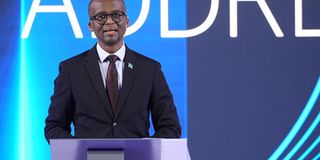AfricaUnlocked forum: How Africa’s trillion-dollar SME growth relies on B20 alignment

Botswana Vice President, Mr Ndaba Gaolathe.
What you need to know:
- Despite its abundant resources, Africa accounts for just one percent of global venture capital flows—a figure that was frequently cited at the forum.
Cape Town. African nations must shift from a dependency mindset to one of self-reliance by prioritising entrepreneurship, inclusive growth, and private sector development, experts have urged at the ongoing AfricaUnlocked 2025 Forum in South Africa.
Organised by Standard Bank Group, the annual high-level forum brings together business leaders, policymakers, investors, and entrepreneurs from across the continent to reimagine Africa’s economic trajectory.
The 2025 edition is being held under the theme “Unlocking Africa’s SME Potential through Strategic Investment and Collaboration.”
Speaking on the opening day of the three-day event, Botswana Vice President, Mr Ndaba Gaolathe, stressed the urgent need for a mindset shift across African states.
“Africa has the resources—both natural and human—yet remains underdeveloped. We must stop seeking aid and instead focus inwardly on nurturing entrepreneurship,” said Mr Gaolathe.
“By 2050, Africa’s population will reach 2.5 billion, with 60 percent being youth. That demographic dividend is our biggest opportunity,” he added.
Despite its abundant resources, Africa accounts for just one percent of global venture capital flows—a figure that was frequently cited at the forum.
Mr Gaolathe called for investment in infrastructure, policy clarity, and mobilisation of long-term capital to create an enabling environment for innovation and enterprise.
“We must think in trillions, not billions. The African private sector holds the key to sustainable growth,” he added.
One of the forum’s key highlights was a panel discussion featuring Standard Bank Group CEO Sim Tshabalala, who emphasised the significance of the Business 20 (B20) process in empowering African SMEs.
“The B20 presents Africa with a unique opportunity to take part in global economic governance. Through partnerships, trade liberalisation, and access to finance, the B20 can be a transformative platform. Africa’s future heavily depends on its alignment with the B20,” said Mr Tshabalala.
He noted that South Africa’s presidency of the G20 offers the continent a rare chance to align its SME development agenda with global economic priorities.
Standard Bank, the continent’s largest lender by assets, is spearheading several initiatives under the B20 Africa Working Group, focusing on financing, digital transformation, and SME formalisation.
According to Mr Tshabalala, African governments need to formulate home-grown policies that cut red tape and make it easier for SMEs to access credit.
“If we don’t formalise our informal businesses, we’ll continue missing out on investment capital,” he cautioned.
Tanzanian entrepreneur and Managing Director of Ona Safari, Mr Julias Mkondo, was among the forum participants.
He shared his perspective as a small business owner navigating the continent’s financial ecosystem.
“Access to capital is our biggest hurdle. Entrepreneurs like me have the ideas and passion, but we lack the funding. Forums like AfricaUnlocked give us hope and access to vital knowledge and networks,” said Mr Mkondo, whose firm operates in the tourism sector.
The Tanzanian experience reflects a broader continental trend, where fewer than 20 percent of SMEs have access to formal credit.
To address this, banks such as Stanbic Tanzania, a subsidiary of Standard Bank, are adopting innovative SME financing models.
Head of Commercial Banking at Stanbic Tanzania, Mr Charles Mishetto, said the bank relies on transaction-based credit scoring rather than traditional collateral.
“Most African entrepreneurs do not have formal collateral. We assess your transaction history. But for that to work, we help you formalise through our SME campaigns. Once you’re formal, funding becomes easier,” he said.
A Nairobi-based economist and African trade policy consultant, Dr Janeth Karimi, added her voice to the conversation, stressing the importance of integrating SMEs into broader value chains.
“Without SMEs in value chains, industrialisation will not take root. Countries such as Kenya and Rwanda are piloting public-private models to link SMEs with anchor sectors like agriculture and clean energy,” said Dr Karimi.
She noted that although Africa contributes only three percent of global GDP, it possesses over 60 percent of the world’s uncultivated arable land, highlighting the continent’s vast untapped potential.
As discussions at AfricaUnlocked 2025 progress, one consistent message has emerged: Africa’s transformation depends not on aid, but on strategic investment, entrepreneurship, and pan-African collaboration.
As Mr Tshabalala put it: “Africa’s future lies not in charity, but in creativity, resilience, and business. With the right tools, our SMEs can become engines of inclusive prosperity.”
With renewed political will and greater private sector engagement through mechanisms such as the B20, hopes are rising that the continent can finally harness its immense potential—moving from poverty to shared prosperity, one enterprise at a time.




